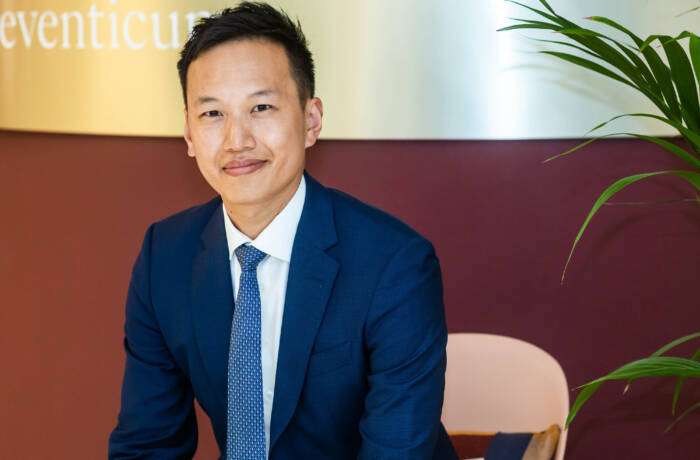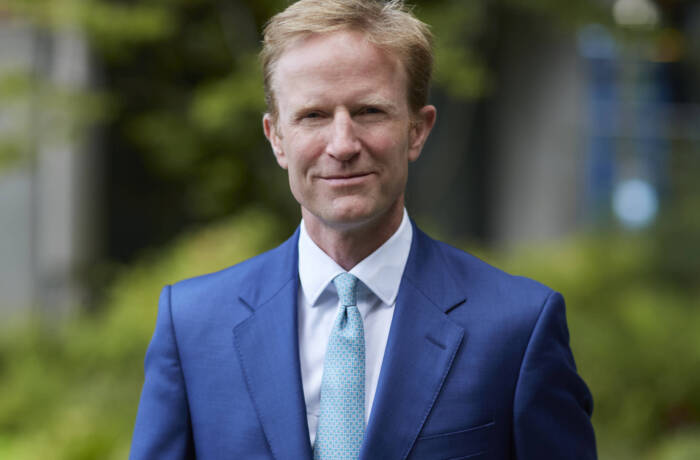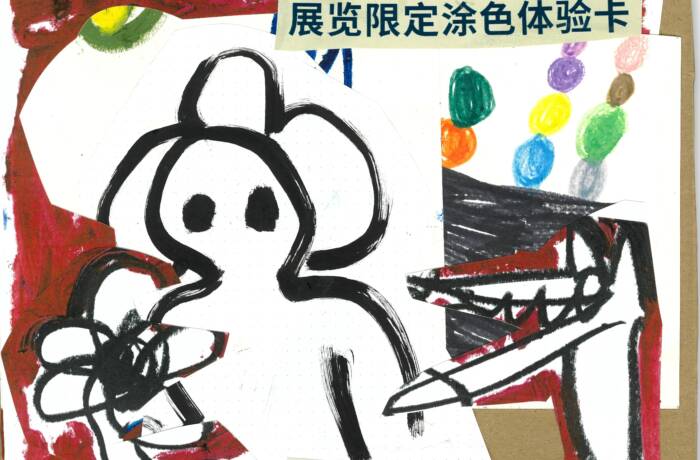
Juanita Ingram is the founder and chair of the board of trustees of Dress for Success Greater London (DfSGL)
Attorney, author and actress Juanita Ingram began working as a volunteer for women’s charity Dress for Success in the United States in 2008, and went on to found the London branch in 2015. The charity’s aim is to empower women by providing them with a support network and professional development tools. Here, she speaks to Samantha Welsh about developing a structure to help women professionally and emotionally, the impacts of the pandemic and embracing the accessibility of a virtual world
LUX: When did you set up Dress for Success and what spurred your passion for the project?
Juanita Ingram: Dress for Success Greater London (DfSGL) was reestablished in 2015, but the actual journey began in the prior year with seeking foundational approval and initiating its startup phase. DfSGL affiliate is part of a global franchise of charities with 150 affiliates that span 30 countries.
In 2008, I was faced with department-wide downsizing (redundancy) while concurrently devoting time as a Dress for Success volunteer with an American affiliate. Even with my successful and established career as an attorney (possessing a J.D. and M.B.A.), I was not shielded from the devastating economic crisis of 2008. By bearing witness, as a volunteer with Dress for Success, to the women who were overcoming immense adversity in their own unemployment, I was reinvigorated when I went through my stint of unemployment. I was blessed with outstanding professional skill sets and impeccable credentials, and still during the 2008 great recession, myself and other professional women like me were not immune from the economic vicissitudes of challenge and change.
Follow LUX on Instagram: luxthemagazine
In my time as a volunteer, I had already become acquainted with Joi Gordon, Dress for Success’s worldwide CEO. When I relocated to London for my husband’s job promotion in 2011, I had stayed in contact with Gordon who later asked me to start the new non-profit affiliate in London. Given my high regard and immense passion for the charity’s mission, which aligned quite well with my own experiences, I felt confident that it was truly an undertaking that I was not only equipped, but also divinely purposed to do. When divine purpose is aligned with a powerful commitment of personal will, the result is mission driven success.
The work, planning, and coordination was incredibly challenging in the beginning, as it is with all startups. One must go through the natural maturation process of building grassroots functionality from the ground up, including fundraising, searching for viable properties, creating a fictional and mission critical team, and building everything from a visionary inventory to a viable and productive volunteer base. While there were certainly days that I questioned my ability to rise to the challenge and continue our mission critical goals, I was inevitably reminded and reinforced by what had already driven me this far; those who had far less, many who were holding on for the one ounce of encouragement and advocacy that would sustain a rebirth of hope and life achievement.

Ingram speaking at the Power of Women Awards 2020
LUX: What kind of women reach out for help?
Juanita Ingram: A few years ago our mission statement set forth that we aimed to help women coming from socioeconomically ‘disadvantaged’ backgrounds; however as the enormous changes to the global economy broadened its impact on our society and especially women, our mission also evolved so that we currently, we serve the ‘unemployed and unempowered’ woman.
Read more: British artist Antony Micallef on his hybrid method of painting
As we have experienced and encountered an incredible diversity of backgrounds and socioeconomic statuses from our clients, we have been privileged to serve a much broader demographic spectrum many of whom emerge from extraordinary and overwhelming circumstances of human trafficking, domestic violence, homelessness, addiction, and incarceration. We also have the privilege to serve women who are recent graduates from higher learning institutions. Our dedicated work includes mothers returning to the world of work, or seasoned executives who have been market classified as job skill redundant and who may find it necessary to polish their interpersonal confidence and enhance their soft skills and interview skills-sets. We anticipate escalating demand for our services as we navigate in the new economic norm. Preliminary surveys reflect that statistically Covid-19 will negatively impact unemployment in women more than any other demographic group.
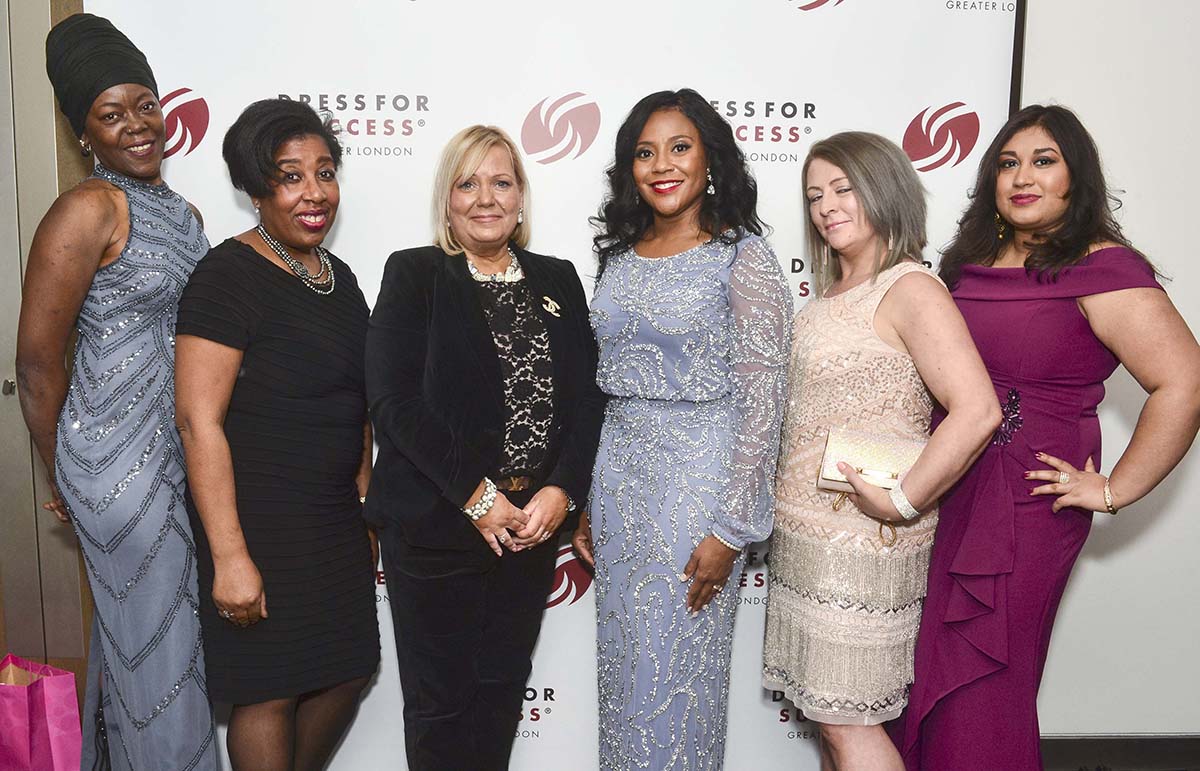
Fionnuala Shannon (Executive Director of DFSGL) and Ingram (centre) with the 2020 Power of Women Clients of the Year winners
LUX: What are the steps to preparing them for success at interview?
Juanita Ingram: DfSGL literally dresses women physically and emotionally from the inside out. We always begin with professional attire because, as we know from sociological research, we only have about seven seconds to make a lasting impression. We live in an increasingly visual world. The fast-paced nature of social media has continued to shorten this “impression” window. With validated research, we now have even less time to really make a substantial impact on potential employers.
While we understand the outer appearance of a person plays an important role in their job seeking success, our 80% success rate at our London affiliate can be also attributed to the thorough interview training and soft skills that we teach and reinforce that immediately after a woman’s personal styling session. During this critical training, we provide mock interviews, CV and resume review, confidence-building activities, and non-verbal body language training. Much of this has been seamlessly transitioned to a virtual format in which DfSGL teaches women about success in a predominantly virtual and universally easily accessible format.
As women, we tend to downplay and psychosocially minimise our successes. DfSGL trains clients to answer questions with power, positivity, and clarity; using enlightening descriptors that highlight their strengths, which ultimately lead with words that are of profound impact and success driven outcomes.
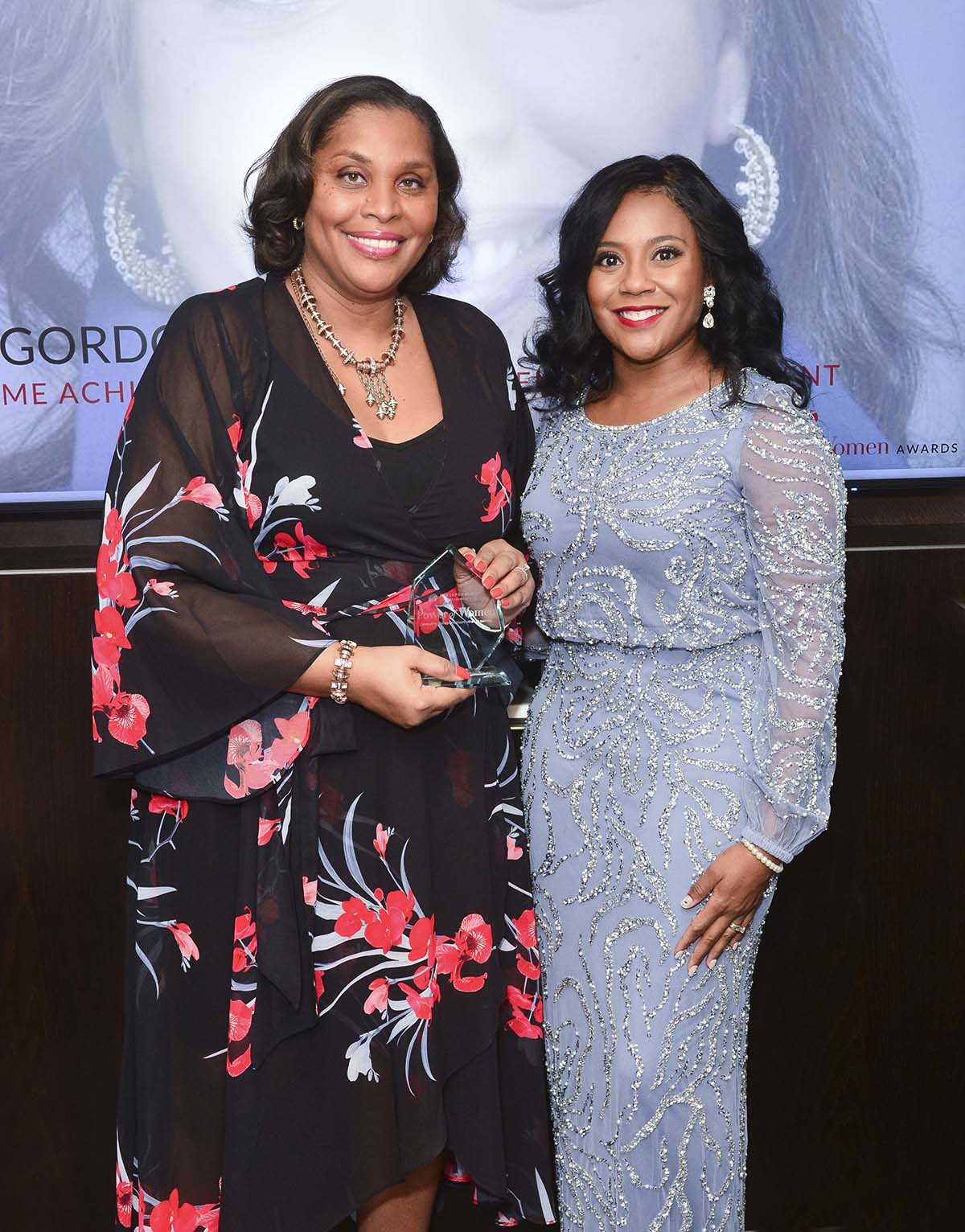
Ingram (right) with Joi Gordon CEO of Dress for Success Worldwide at the Power of Women awards 2020
LUX: What is your hit rate in placing clients?
Juanita Ingram: Our London affiliate’s 80% success rate is due in large part because of our focused job interview training, and DfS is among the few types of nonprofits whose impact is seen almost instantly.
The first client I ever mentored, styled, and empowered, had managed to escape a domestic violence situation and resorted to living in her car. The moment she saw herself in the dressing room, there was an instant transformation of personal and emotional self-esteem. The services we provide enable a woman’s impression of herself to change dramatically in the sense that she sees herself in a way she hasn’t seen herself in a long time, or perhaps ever before. We help women shape their self-worth, self-image, and self-esteem, which ultimately leads to their reenergising level of self-efficacy.
LUX: How do you support clients once they’ve won the job?
Juanita Ingram: DfSGL offers several support programs to our clients after their initial dressing and training and successful job attainment. Our foundational support standard is provided by being the Professional Women’s Group (PWG). PWG is a monthly support group for our newly employed clients and works to ensure our clients ultimately sustain and thrive in their newly attained positions. We also provide several workshops each month to ensure and support prolonged client success inclusive of financial literacy, makeup techniques to enhance presentation in the workplace, negotiating skills, and other forms of sustainable professional development.
Each PWG class offers a supportive environment for successful clients to bond, interact, and be success supported. The members of the group encourage one another in professional endeavours. In addition to skills and strategies acquired through ongoing workshops, we are also motivating and encouraging clients to develop a network of client peers and virtual advocate staff in light of COVID-19. Though these diverse support offerings are not intended to substitute for professional mental health services, the support meetings have often served as a way for women to unpack and confront the staggering difficulties that this year has brought them in an advocate based supportive atmosphere.
Read more: Life coach Simon Hodges discusses how to build harmonious & loving family relationships
LUX: Circularity is key to your strategy – what sorts of partnerships have accommodated your vision on the fashion supply side?
Juanita Ingram: Dress for Success has a mission driven duplicity of service existence in that not only do we employ fashion to empower women; we also extend the useful life cycle of garments and contribute to fashion sustainability in significant ways. Our affiliate thrives from the generous support from fashion leading corporations, fashion brands and retailers. Our corporate supporters often run clothing drives and encourage their executive women to donate gently used items. For example, we were fortunate to be selected as the charity of choice for the London law firm Weil. They financially supported DfSGL programming, hosted in-house clothing drives, and supported our annual Power of Women awards.
We have also received mission critical support from numerous fashion brands who seek philanthropic and alternative sources to dispose of end-of-the line fashion garments. The companies avoid burning or disposing of garments in a manner which avoids the production of waste. Fashion brands and retailers such as Ralph Lauren, Gucci, McArthur Glen Outlets, to name a few, have opted to donate pieces to DfSGL instead of participating in the common practice of burning surplus clothing. To put it simply, our organisation is fashion sustainability personified. DFS affords the opportunity to give new life to clothes destined for destruction. This sustainability initiative further empowers new and positive perspectives in the lives of thousands of women.
While some donated apparel cannot be repurposed for professional interview purposes, brands like Adrianna Papell are global DfS partners and have permitted the London affiliate to resell formal wear pieces in what we call our Confidence Shop, a fashion resale charity shop in Kensington. All monetary proceeds from such sales are used to support our mission and the women that we serve. These types of philanthropic partnerships are dramatically extending the life cycle of fashion garments and significantly reducing abundant clothing waste. At DfSGL, we reflect “goodbye land fills and welcome to second chances” for the donated garments supplied to our clients.
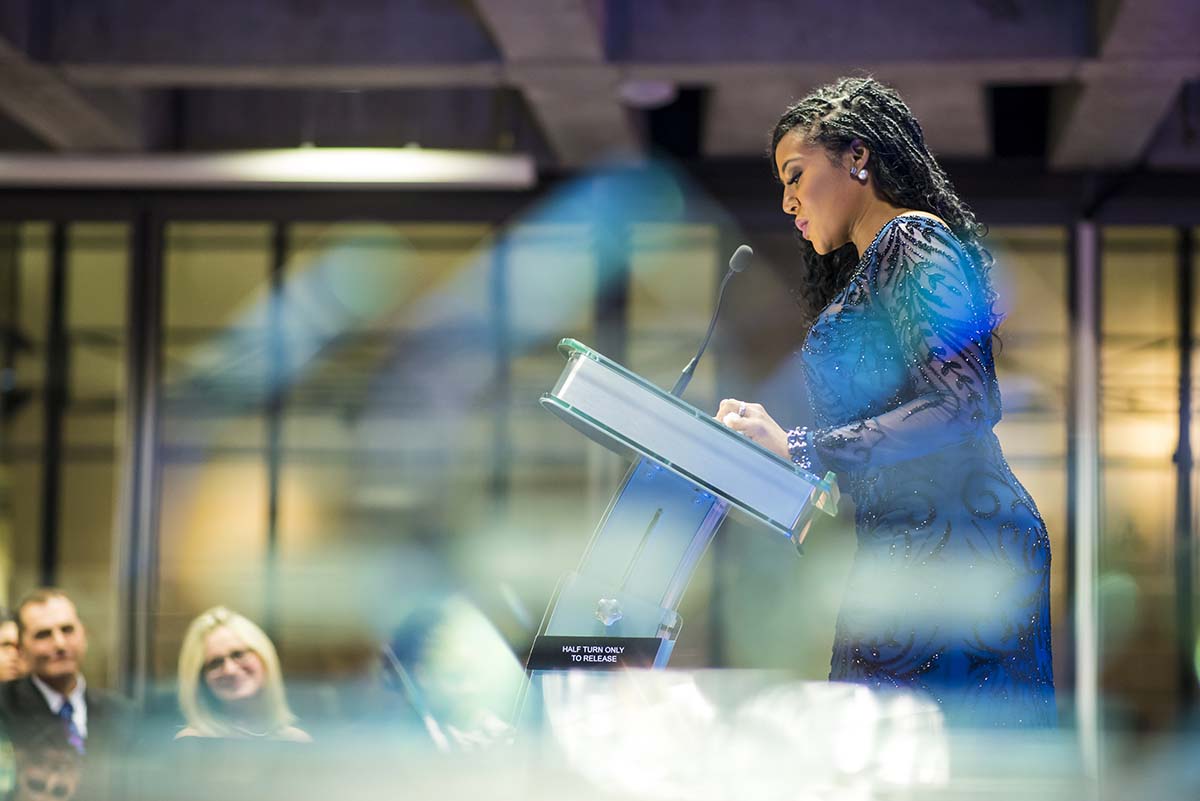
Ingram at the Power of Women Awards 2020
LUX: What do you believe is the motivational factor behind these partners getting involved?
Juanita Ingram: Philanthropic partnerships produce outcomes and impact – these are the core motivational factors that we see most often in the calibre of partners that support the work that we do. We are fortunate to have numerous like-minded corporate and fashion retail supporters who are drawn to the work that we do. Ultimately, their primary desires and motivations are to support women. Companies gravitate towards our charity because our core values are synergistically aligned: empowering women, tackling poverty, and having a positive impact on our planet through a highly valued fashion sustainable initiative.
Statistically, when you change the professional and interpersonal trajectory of a woman’s life, you also empower a corollary impact upon the lives of the people who support and depend on her. When the opportunity to support a green fashion sustainable initiative that empowers over 1200 women annually in London presents itself to companies and their brands, they are expedient and strategic to provide support and align with our mission. The indirect financial result of the work that we do saves the city of London on average 2million pounds annually. Corporate sponsors and brand partners know that they can trust our services and that their investment in the charity and the women we serve will yield a great return on investment.
LUX: How do you transfer the skillset you’ve developed in law and real estate to fundraising? Would you describe fundraising as a business?
Juanita Ingram: The business acumen and related skills acquired from my 18 progressive years as a business attorney have greatly informed my experiences and planning with Dress for Success Greater London, Dress for Success Chattanooga, and Purpose Productions Inc. My first few years of legal practice were devoted to helping to structurally establish nonprofits and give them the foundational knowledge and tools to govern themselves, which, of course, are critical to the process of successful operations, organisational governance, and fundraising.
The ability to apply the wealth of academic knowledge and practical experiences from my law and MBA degrees continues to prove beneficial in strategic planning, corporate sponsor relationship management, and board leadership. When presenting the long-term impact of our work to donors, sponsors, and volunteers, the unique ability to effectively deliver substantiate a clear and effective business case; inclusive of the return on their investment metrics (ROI) is vital. With giving, people desire transparent communication and a clear strategy for applying all donated assets with integrity and in a manner that is fiscally responsible. Our actions must align with our vision, mission, and values.
The fundamental ability to clearly articulate how funds are used, as well as how clients, donors, and their community will benefit from a strategic and technical standpoint is the hallmark of a successful non-for-profit entity. When one merges sound fiscal practices with the ability to manage relationships, as one frequently does in the practice of law, you maintain much needed transparency and integrity with donors. In fact, fundraising quickly becomes the business of relationship management.
Proper governance, effective operational management, and innovative fundraising strategies for a nonprofit business are essential to the sustainability and success of the organisation.
Read more: Entrepreneur Wendy Yu on creativity & charity
LUX: Are there individual success stories that you are particularly proud of?
Juanita Ingram: Our 2019 Client of the Year, Runa came to us after suffering from depression and a series of suicide attempts. Her subsequent transformation has been so profound. This young woman is a testament to a woman’s internal strength and tenacity to pivot her life in remarkable ways. When I see a transformational journey like this, which has included hosting her own podcast and exploring the work of radio, I am affirmatively reminded of DfSGL’s purpose.
In addition to our Client of the Year, we had the opportunity this year to highlight some additional clients with amazing journeys of triumph and transformation, and resiliency. Our Power of Women Awards, which takes place every March during International Women’s Day, celebrates ordinary women doing extraordinary things. We provide a platform for women executives locally and globally for their advocacy of empowerment and workplace upward mobility. In 2020, in honour of celebrating the fourth year that this event has been held since establishing the new London affiliate, the accompanying panel of speakers highlighted four DfSGL clients and their success stories.

LUX: COVID has placed particular stresses on women especially across the world. How has the organisation been able to crisis-manage an integrated response when no one has ever experienced a pandemic?
Juanita Ingram: Our Executive Director Fionnuala Shannon and I have heavily leaned on and learned from one another this year. While many small to mid-sized charities have closed their doors in the wake of COVID-19, Dress for Success Greater London managed to adapt to our “new normal” rather quickly. We are determined that Covid-19 will not defeat us, but rather define us!
The seamless relationship between the Chair/Founder and Executive Director of a nonprofit is critical on a normal day. The personal and professional rapport between Fionnuala and I is what allowed us to forecast and persevere in a powerful and sustainable way. Amidst the pandemic, we’ve managed to raise substantial funds, maintain corporate relationships, and operations, as well as provide new, innovative programs.
I am currently residing and operating my non-profit production company remotely while living in Taiwan as an expat for my husband’s job promotion which has enabled me to have a very insightful lens on the pandemic. Having the vantage point of operating businesses on three continents (the US, UK, and Asia) has further enabled me to be informed about COVID-19 prior to my US and US counterparts. Leveraging the information and knowledge that I acquired while in Taiwan (which has successfully managed the pandemic as a country) has proven to be beneficial to our London affiliate.
Read more: Marine biologist Douglas McCauley on environmental philanthropy
Witnessing and experiencing firsthand Taiwan’s swift response to the initial spread of COVID-19, provided me with the advantage of being able to craft organisational response plans earlier than most. You see to deal with COVID-19, I find one has to be proactive rather than reactive in preventative planning that ensure the viability of one’s business and own personal health. With this position of knowledge-based strength and posture of informed and insightful leadership, Fionnuala and I were able to get ahead of the curve well before much of the Western world. As a result, we were able to pivot our services to accommodate the needs of our clients in the new norm.
One program which was borne out of the need to innovate and shift during the pandemic was the development of DFS Express, which is a virtual styling and clothing provision program I launched in London and in the US. By meeting with clients virtually, DfSGL is still able to provide styling and training sessions; while delivering garments via mail or other services. Our affiliate in Chattanooga, Tennessee (US) has had to adapt the program in different manner, as this affiliate is still in the start-up phase and launched in the midst of COVID-19. In lieu of mailing physical fashion pieces, our Tennessee clients have been sponsored by donors to purchase what they need online through the distribution of cash gift cards. With the utilisation of this new online purchasing methodology, DfSGL is able to continue supporting women through unprecedented circumstances while also safeguarding them in addition to our team of staff and volunteers.
LUX: How do you see services evolving after mass vaccination over the medium term?
Juanita Ingram: Our services will continue to evolve as the world begins a phased approach to reopen. We learned during this time that the application of innovative virtual services is hugely beneficial, and we will continue to utilise this approach in the future. Meeting with clients virtually enables us to serve more women who previously may have found it limiting to visit us in person because of limited access to transportation and childcare services. The infusion of technology into our service model resulted in a positive and innovative outcome of in enabling us to have a wider reach. While DFSExpress was born out of necessity, it has addressed a gap in client accessibility. With this newly virtual presence, we have the capacity to serve more women. We will certainly sustain some of these learned practices and innovations that have allowed our outreach to grow as we navigate the emerging new post-pandemic norm.
LUX: What advice would you offer someone thinking about starting their own foundation?
Juanita Ingram: Fundamentally, nonprofits are still businesses, albeit people businesses that touch the lives of individuals each day. It is vital to be mindful of your purpose, mission, values and the people you are serving through your organisation every step of the way. Remembering why you embarked down this path will sustain you through the hard times and through the unexpected.
Non-profits are sophisticated business models with the added complexity of your purpose and mission. Unlike for-profits, generating income or fundraising is not the only factor in measuring success and one must be mindful that no mission or organisational size is too small to have a major impact on your local community, country, or the world. One’s definition of success must remain intrinsically linked and aligned to your mission statement and the people you are purposed to help. One must also have a balanced formula centred upon the application of passion, capability, and continuous learning. Nonprofit management and related operations is an industry, so always stay in a competitive position of learning.
For more information on Dress for Success Greater London visit: dressforsuccessgl.org
Follow Juanita Ingram on Instagram: @iamjuanitaingram
Samantha Welsh is a contributing editor of LUX with a special focus on philanthropy.

